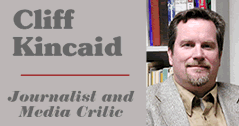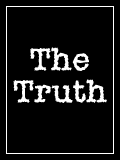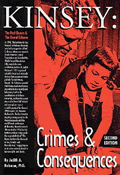Other
Kincaid
Articles:
By Cliff Kincaid
May
18, 2006
NewsWithViews.com
Harry Jaffe of The Washingtonian has written that USA Today reporter Leslie Cauley�s story about how the NSA collected �average citizens� phone records from their telecommunications companies, like AT&T and Verizon,� was a real �scoop.� He says other papers have been scrambling to keep up, and that USA Today has arrived on the national scene with this blockbuster. But it looks like Jaffe�and USA Today�may have gotten the basic facts wrong. The USA Today story, based entirely on anonymous sources, has been seriously challenged.
We should be asking: a scoop of what? Something about this scoop doesn�t smell right.
Cauley is quoted by Jaffe as saying that her NSA story �further validates the use of confidential, unnamed sources. They have a real value in our business.� Well, not so fast. Verizon has released a statement noting that �One of the most glaring and repeated falsehoods in the media reporting is the assertion that, in the aftermath of the 9/11 attacks, Verizon was approached by NSA and entered into an arrangement to provide the NSA with data from its customers� domestic calls.�
There is no doubt as to what the statement is referring to. The Cauley story claimed that the NSA�s �domestic� program targeted the calls of �ordinary Americans.� She alleged that the NSA was collecting �domestic call records� involving �calls that originate and terminate within U.S. borders.� But these assertions are now in question. The Associated Press reports that BellSouth Corporation has made a similar denial of the main essence of the Cauley story.
Haven�t we seen this kind of thing before? The controversy over the USA Today story suggests, once again, that the media have rushed into print with something that looks bad, in order to concoct a scandal for the Bush Administration and drive down the approval numbers of the President. This is getting to be old hat for the liberal press. During a time of war, our major papers have, time and time again, seized upon an alleged secret activity in order to make it appear as though it�s the Bush Administration�not the terrorists�that we need to fear. The key to this approach is trying to convince the public at large that the Bush Administration is out to get them.
If the USA Today story had been written to suggest that records of international long distance calls involving al-Qaeda operatives were being collected by the NSA, in order to identify their U.S. domestic contacts or cells, there would have been no story of any concern to those who want to win the war against terrorism. That may be why it was made to suggest that John Q. Public�s innocent phone call to the local pastor or baseball coach was at risk of being monitored.
It appears the basic flaw in the story, as suggested by the entire Verizon statement, is the assumption that phone companies passed along records of local calls to the NSA when the company says such records may not even exist in most cases. International phone calls involving suspected terrorists and their contacts inside the U.S. are a different matter.
We know, because of the fallout from the original James Risen/Eric Lichtblau New York Times story about the NSA program, that the purpose of the effort has been to monitor contacts between al-Qaeda operatives here and abroad. Of course, that�s not the way the Times portrayed it. Like Cauley of USA Today, the Times suggested that the NSA was monitoring �domestic� calls involving ordinary people. However, in a follow-up story on December 24, Risen and Lichtblau alleged that the NSA was also tracing and analyzing �large volumes of telephone and Internet communications flowing into and out of the United States.� They said U.S. telecommunications companies were helping the effort but didn�t name them.
USA Today not only named them but alleged that domestic phone records involving millions of ordinary Americans were being turned over. This is the sensational aspect of the story that has now been challenged by some of the companies said to be involved.
This is the media template that has been developed: distort and sensationalize an ongoing intelligence operation into something that threatens or scares the daylights out of John Doe. We saw the same approach in the infamous Dana Priest Washington Post story about CIA �secret prisons.� If she had written a straightforward story about the U.S. Government secretly apprehending and detaining terrorists, the reaction by the public would have been a yawn or a hallelujah. But to claim the government was maintaining �secret prisons� or even Soviet-style gulags, as she implied, took the story to a more sensational and frightening level. It made the Bush Administration look worse than the terrorists. The trouble is, nobody has been able to confirm the �secret prisons� exist. It is of no concern to the Post, of course, because Priest has already won her Pulitzer Prize.
USA Today, which was supposed to have a tighter policy on the use of anonymous sources under editor Ken Paulson, may have another scandal on its hands with the Cauley NSA story. Many forget that USA Today ran with the same phony documents on President Bush�s National Guard service that got CBS News and Dan Rather into trouble and led to firings at that network. USA Today was anxious to get into print because it knew that CBS was running the story. The paper had to run follow-up stories about how it was fooled but never apologized to its readers.
In the NSA controversy, USA Today has no phony documents, only anonymous sources and official denials from some of the companies. Ironically, all of this is happening under editor Paulson, who took the helm of the paper in the wake of the Jack Kelley scandal at the paper. Reporter Kelley was a serial fabricator whose anonymous sources turned out to be nonexistent.
If the USA Today story about the NSA is going to hold up, the paper will have to produce some hard evidence, not more anti-Bush drivel from �sources� whose information now looks questionable if not false.
|
Subscribe to the NewsWithViews Daily News Alerts! |
Looking
even more foolish are the politicians who jumped on the story as if
it were true and demanded hearings on the matter. Senator Patrick
Leahy even brandished a copy of USA Today, as if it were the Gospel.
He must have forgotten about the paper�s use of the fake Bush National
Guard documents.
� 2006 Cliff Kincaid - All Rights
Reserved
Cliff Kincaid, a veteran journalist and media critic, Cliff concentrated in journalism and communications at the University of Toledo, where he graduated with a Bachelor of Arts degree.
Cliff has written or co-authored nine books on media and cultural affairs and foreign policy issues.
Cliff has appeared on Hannity & Colmes, The O�Reilly
Factor, Crossfire and has been published in the Washington Post, Washington
Times, Chronicles, Human Events and Insight.
Web Site: www.AIM.org
E-Mail: kincaid@comcast.net
USA Today not only named them but alleged that domestic phone records
involving millions of ordinary Americans were being turned over.












